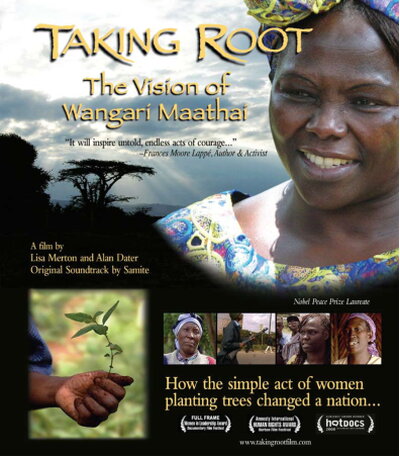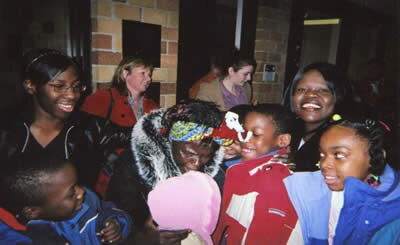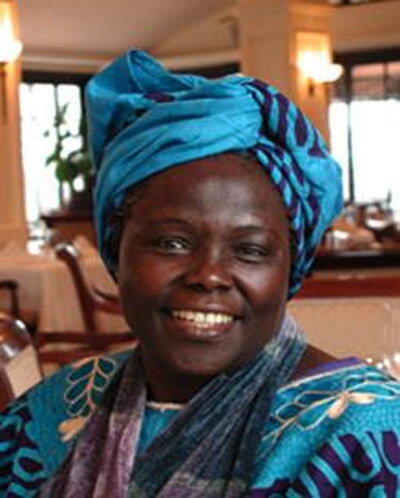

International Women’s Day: Remembering Professor Wangari Muta Maathai
(In commemoration of International Women’s Day the Center for African Studies and the African Students Organization organized a showing of “Taking Root” , a film based on the life of the late Nobel Peace Prize Winner, Wangari Maathai. UIUC Ph.D student Anne Lutomia, who comes from Kenya and attended the same high school as Maathai, spoke at the event. This is the text of her presentation.)
Wangari Maathai Through My Eyes--by Anne Lutomia
My name is Anne Lutomia. I am a doctoral student at the University of Illinois at Urbana Champaign and a native of Kenya. I am pursuing a degree in Human Resource Development and a minor in gender, women studies and policy.
I will discuss how I heard and therefore understood Wangari Maathai. Growing up in Kenya, I knew the media was silent about women and politics, especially women who wanted to bring about change. The first time I heard of Wangari Maathai was when the media condemned her for hindering the building of a skyscraper in the only park in Nairobi--Uhuru Park. She won this battle. From there onwards the media wrote negative things about her. President Moi also condemned her and pointed out that she was not behaving like an African woman should. In short, she was thought to be rebellious.
Like Wangari Maathai, I attended Loreto High School Limuru. She was celebrated in Limuru for leading the Greenbelt Movement in working with local women to plant trees. As mentioned in her book, the nuns not only inspired us to work hard but they also grounded in us a sense of knowing what is just. I was attracted to Wangari Maathai’s vision of reforestation because I too had seen the only equatorial forest (Kakamega forest) near where I grew up diminish and change the environment--the rainfall season changed, the vegetation disappeared, some insects and animals vanished as my small town changed into a university and administrative town.
In the 90s, Kenya was a turbulent nation and the university was a hotbed for political change. Many young University students were sent to prison for challenging the government. We had been hearing of Wangari Maathai camping with mothers whose sons were in prison at the Freedom Corner in Uhuru Park demanding their sons’ freedom. The government saw these women who were on a hunger strike as a menace so they attacked them. The older women tapped into the African traditional culture to fight back. They stripped naked and showed the police their breasts. In the African culture, every woman who is of your mother’s age group is your mother and is accorded respect. By showing the police their breasts, they were cursing them. As a young woman in Kenya I saw a neighbor use this tradition to prevent her property from being auctioned. Admittedly, I think this tradition is fading away in some areas of Kenya due to modernity, especially in towns where the body of a woman is not sanctified anymore and the African culture is considered irrelevant.
As I stated earlier, in the 1990s Kenya was going through some political changes. We wanted a multiparty system. As a public university student I remember politicians visiting the campus and rallying students to join them in bringing change. Male students participated in the rallying which would turn into riots and the closing of the University. Some of them lost their lives. Female students wanted to participate but feared incidents of beatings or rape. During this time Wangari Maathai worked with the opposition party and was also involved in saving Karura forest near Nairobi. In her effort to save Karura forest she was beaten and sent to jail for some days. Markedly, during such events she would be the only woman. The others would be young male opposition party members and male students from the public universities based in Nairobi.
She campaigned for the position of the presidency in 1992 but did not win. She did not win because she did not have funds to campaign. Nonetheless thereafter she campaigned as the MP for Tetu constituency and won by a big margin. She later served as an Assistant Minister of Environmental Conservation. Her work with women in Kenya especially around land ownership was pivotal in the changing of the constitution. Now, Kenyan women can inherit land whereas before the land was only allocated to the sons of the family.
In 2006, I got to meet Wangari Maathai during an annual event for teenagers that brought Nobel Peace Prize winners to Minnesota to inspire the young people. I was there because I coordinated a program of first-generation immigrant girls to go to college. I had brought a friend’s children to listen to her. When we went backstage to greet her, the security people were preventing us, but when she saw the children she asked them to come to her and hugged all of them. Below is a photo of Wangari Maathai hugging those children. To me, this opportunity was a dream come true, I felt honored to meet one of the most powerful and inspiring woman in the world, whose story I could relate to.

(Nobel Prize winner greeting children in Minnesota)
Unfortunately, in September 2011, Wangari Maathai died of ovarian cancer. Her work as a leader in the women’s’ movement continues to inform many scholars and leaders. Even in her death she continues to inspire the world. Because of her, t he following events have taken place:
- This year the African Union set aside March 3 as the Wangari Maathai Day where various African countries celebrate her by getting involved in environmental activities.
- Wangari Maathai elected to be cremated because it is an environmentally friendly process. A number of Kenyans have since elected to be cremated.
- African Nations have decided to plant a wall of trees from Djibouti to Mali.
- Wangari Maathai continues to inspire me, and as a scholar I am interested in including her in my research. This is the second public event where I have made a presentation on Wangari Maathai.
Brief Biography of Wangari Maathai

Wangari Muta Maathai was born in Nyeri, Kenya (Africa) in 1940. The first woman in East and Central Africa to earn a doctorate degree, Professor Maathai obtained a degree in Biological Sciences from Mount St. Scholastica College in Atchison, Kansas (1964). She subsequently earned a Master of Science degree from the University of Pittsburgh (1966). Professor Maathai pursued doctoral studies in Germany and at the University of Nairobi, obtaining a Ph.D. (1971) from the University of Nairobi where she also taught veterinary anatomy. She became chair of the Department of Veterinary Anatomy and an associate professor in 1976 and 1977 respectively. In both cases, she was the first woman to attain those positions in the region.
In 2012, the 14th Africa Union Summit agreed that March 3rd each year from now on will be Wangari Maathai Day. It is a day to remember Professor Maathai and her lifelong commitment to good governance, environmental responsibility and peace. Previously, the 3rd of March was the “Africa Environment Day”.
At the first annual Wangari Maathai Day celebrations will take place in countries across Africa. The day’s events will focus on celebrating her accomplishments and mobilizing people to overcome environmental challenges to help ensure a better future for all. This year the Government of Chad hosted celebrations and the key focus was on "Saving Lake Chad", one of the continental lakes facing the threat of drying up as a result of the worsening effects of climate change and desertification.
In Kenya the Green Belt Movement was celebrated by hosting a tree planting event on March 10th at Freedom Corner in Uhuru Park, a special place for Wangari during her lifetime in remembrance of her. The event will be open to friends of the GBM, school students, and members of the public for a special tree planting event, music, and tributes.